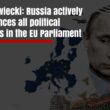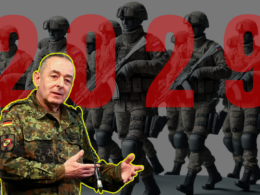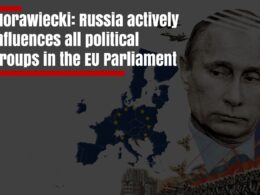Putin once again promoted one of the essential narratives of this war. This narrative glorifies death, making it a cult of death for the country.
The Russian president stated to Nina Pshenichkina, a member of the unrecognized LPR’s “public chamber,” whose son was killed in the Luhansk region in 2019, during a meeting with mothers of troops (which appeared to be false ones), last week:
“We will all leave this world someday. It must happen. How we live is the question. After all, it is not clear whether some people live or not. And how do they die? From vodka or something else. And then they went and lived or did not live – unnoticed. Yet your son lived. And he succeeded in his mission. This proves that his death was not in vain”.
In this declaration, one of the central narratives of this war was once again defined by Putin; it has been expanding throughout the conflict and may now be at its peak. This narrative is about how death has been elevated to a cult and glorified.
The idea that it is honorable to die for the Motherland and the President (even if you do not fully comprehend the meaning of the war he is waging) was frequently heard in the speeches of politicians, the posts of patriotic bloggers, and the propagandists on TV screens before the “partial mobilization” started.
The passing of Daria Dugina, the far-right Russian propagandist Alexander Dugin’s daughter, was one of the most triumphant moments in the cultivation of death. People attending her funeral remarked on the “special light” from the corpse, and commentators said her passing had a unique meaning.
Alexander Prokhanov, a member of the radical conservative movement, wrote the following to Alexander Dugin in particular: “Your daughter performed a great act of filial duty by taking the hard blow intended for you. Weapons systems, brave warriors, and wise leaders are engaged in battle in Ukraine. And the senses are fighting there: the meaning of cosmic darkness and the meaning of radiant light. Alexander Helievych, it is you who carries this brilliant light. Every great idea requires a tremendous price to be paid”.
In his speech to recruit prisoners for the war against Ukraine, Yevhen Prigozhin also made a case for the attraction of death: “Do you know someone with a ten-year sentence who can help you escape your slump? How do you feel? Two people do this. In a wooden box, there is Allah and God. You are taken alive, too. I don’t always bring you back, though.”
Instead, a well-known film director, Nikita Mikhalkov, emphasized one of these convicts’ death in Ukraine as the highest value when discussing his “achievement” (in which Gulagu.net volunteers uncovered a criminal involved in torturing in prisons): “He knew what to die for.” The deceased was pardoned and treated like a warrior. Thus, his family is entitled to benefits and payments, Mikhalkov emphasized, adding that the state praised the prisoner for his “feat.”
Every single daily report from Ukraine glorifies death. For instance, here is the piece on Dmytro Hornev’s burial from the Tyumen region: “We paid our respects to those who died while performing their duties by performing a military salute, guard of honor, and military band. In a unique military mission, a guardsman-reconnaissance soldier participated in combat operations. Dmytro died bravely, dedicating his life to protect the Homeland!”
Even in interactions with children during the classes “Talking about Important Things,” it is underlined how little human life is about the goals set by the state. These sayings are taught to third- through fourth-graders as an illustration of true patriotism: “The happiness of the Motherland is more precious than life,” and “It is not scary to die for the Motherland.”
It is advised to get ready in advance for the possibility that your child may choose to die for the Motherland: Russian priest and rector of the Church of the Great Martyr Barbara Mikhail Vasilyev said that if women gave birth to more children, it would be easier to let them go to war against Ukraine. “By nature, God often allows every woman to give birth to many children. She will give birth to more than one child if she does not take abortifacients. As a result, giving it up is not as scary and challenging for her, “said the priest, and a short time later, he passed away in Ukraine.
According to literary critic Mikhail Edelstein, who researched the work of Z-poets, patriotic poetry is also rife with death exaltation, often to the point of “natural necrophilia.” “Their tranquil “bourgeois” lifestyle represents the end of the world. Only the sacrifice, bonfire, and feat are worthy alternatives.”
Our road is the way of death, declares poet Anna Dolgareva (who recently boasted on her telegram channel that it was her friend who stole a raccoon from the Kherson zoo).
We may be wrong.
Anna Dolgareva’s poem
We may be freaks.
We don’t belong in the modern world at all.
But we follow the path of death,
We’re not afraid to look it in the eye.
They are scared of us in the end
Because no one else dares to walk the path of death.
Let’s rise! by Russian pop musicians who supported the war was one of the “anthems of death,” in contrast. Ironically, many have dubbed this song “The Song of the Walking Dead” because of the dismal performance, the mourning clothing, and the chorus, which unmistakably mimics the cry of the dead, “Let’s rise.”
Finally, the worship of death presents itself as a farce after growing to an unbelievable size. Early in November, Moscow hosted the “Necropolis” exhibition, showcasing the newest funeral service trends. The “Expocentre” was filled with animators dressed as soft coffins, businesspeople debating mobile crematoria and import substitution in the cremation oven market, and master workshops in ceremonial floristry were offered.
A famous quote from Putin regarding the West is now considered a type of slogan for this new world, in which human death is valued more highly than human life: “We will go to paradise, while they will just die.”
This statement was recently chanted by those calling for a nuclear missile attack on the United States during the Moscow “March on Washington.”
Another quotation, nevertheless, might serve as a signpost for this death cult. In regards to Ukraine before the conflict, Putin said, “Like it or not – bear it, my beauty.” Even while this statement had no associations in the West, the Russian people immediately recognized it as a quote from the punk band “Red Mold” song, which referred to the act of necrophilia.








